Making the decision to seek relationship help can be wrought with fear, insecurities, and even embarrassment. It’s difficult for most people to ask for help, but it can be even more complicated when the struggle is with personal and intimate relationships. There are two people involved in the decision-making process. Often couples have a false belief that successful couples should be able to manage struggles on their own.
Dr. John Gottman, researcher and renowned relationship expert has been studying couples for almost 50 years. Through his research he found four common signs that lead to relationship demise. These indicators, known as the Four Horsemen, are Criticism, Defensiveness, Contempt, and Stonewalling. Even the healthiest of couples may occasionally engage in the Four Horseman. but these couples are privy to the skills that combat these common behaviors. He refers to these couples as the Masters of relationships.
Differentiation between the “masters” and the “disasters” lie not only in preventing the four horsemen. Those who have healthy relationships make and accept repair attempts by their partners. A repair is “any statement or action, silly or otherwise, that prevents negativity from escalating out of control.” Research shows that a repair attempts between a couple lead to more positive feelings and actions toward their partner. Gottman and his colleagues found that the ratio of these positive to negative acts and feelings for healthy couples is 5:1. In fact, couples often wait too long before seeking help for their struggles. The average couple waits six years before they reach out. SIX YEARS!
How do we Know when to Seek Relationship Help?
1. Lack of connection or feelings of loneliness
From time to time it is not abnormal to feel a bit of a disconnect as relationships ebb and flow. Yet, if you or your partner are experiencing more consistent feelings of loneliness, it may be time to focus more on your relationship. Lacking connection in a relationship can leave you feeling fearful, insecure, and hopeless. Finding ways to build fondness and admiration and create rituals of connection are key to a thriving relationship. These skills will enhance the relationship you have with your partner in a positive way.
2. Life transitions that bring about excessive stress
Couples can go through many different life transitions which may present with significant stress. Having a baby, career changes, financial struggles, moving homes, loss of a loved one, and empty nesting name only a few. These different life phases can bring about various challenges for your relationship. Managing roles along with differing wants and needs will call for compromise. Parenting brings along its own set of challenges with the ever-changing phases of your children’s lives. In the first three years of a baby’s life, studies show that 67% of couples experience decreased satisfaction in their relationship. Couples see this trend again in their relationship when children become teenagers
3. Trust issues
Trust and commitment are the foundation to a successful relationship. These are the two walls of the sound relationship house theory on which successful relationships are built. Feeling uneasy in your relationship is not a positive sign. The ability to be vulnerable and share feelings with your partner is crucial to building true intimacy. If you find that jealousy or fear are common feelings experienced, it may be time to give your relationship a tune up.
4. Constant conflict
Many couples feel that a lack of arguments lead to satisfying relationships. Furthermore, many think that simple communication skills will help them to fix their problems. This is a myth. A successful relationship has nothing to do with the lack of disagreements. In fact, processing arguments with healthy skills promotes intimacy and connection. The process and patterns of how you argue is what is important to look at.
Furthermore, the difference lies in if partners make, identify, and accept repair attempts. 69% of problems between a couple are perpetual. This means that only 31% of the problems encountered in a relationship can are solvable. Conflict is a normal part of every relationship. But, feeling misunderstood, defeated, down, and hopeless due to your conflict is not healthy. These signs may mean that it is time to talk with someone to learn evidence-based skills that will enhance your relationship.
5. Keeping secrets
Keeping secrets is a quick way to cause deterioration in a relationship. Feeling safe to share with one another and being honest is what builds trust and further establishes security. If you find that you are fearful to open up to your partner, this is a sign that your relationship may not be stable. Keeping secrets is indicative to seeking further help with your relationship.
6. Considering an affair
This is a red flag that seems all too obvious. But, often there were previous signs that indicated issues well before this consideration took place. Feeling misunderstood by your partner and struggling to communicate causes disconnect. The lack of connection and security can at times lead people to seek out getting their needs met in other ways. Relationships can survive emotional, sexual, and financial infidelities and other betrayals. However, it is always best to deal with these issues before they happen.
7. Feelings of negativity
Negativity can be a difficult space to live in. Stable relationships have on average a 5:1 ratio of positive to negative interactions during conflict. It is important to understand why there is a need for much more positive interactions to keep relationships in a healthy place. When we experience negativity, it is our nature as human beings to dwell on the negative feelings that accompany this experience. It’s crucial to manage feelings of negativity early in a relationship. The ability to do this helps couples avoid experiencing Negative Sentiment Override (NSO).
NSO occurs when a couple experiences patterns of trust that have been broken in several areas so negative attitudes develop as a result. Often these feelings are a breeding ground for couples to begin to make assumptions. When assumptions are present, often partners begin to respond based on these negative assumptions. The positive feelings once held between two partners fade while negative feelings emerge. To learn more about Negative Sentiment Override, read this blog article through the Gottman Institute and take the free quiz.
Making an Informed Decision
Knowing when to seek help can be crucial to a relationship. More couples need to take the approach of seeking help to enhance one’s relationship rather than to fix it. Marriage therapy is not only for those with significant relationship issues. In fact, those that seek help as a preventative measure often fair best. Think of it as no different from changing the oil in your car every 3,000 miles or having yearly well checks with your doctor. Relationships are difficult. Being proactive rather than reactive can be the difference between one that declines and one that thrives.
For more information on these evidence based skills and more, contact our website or visit our YouTube channel to learn more about our couples program and watch our series of relationship tips called Relationship Remedies: Bringing Couples Closer.

